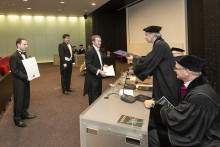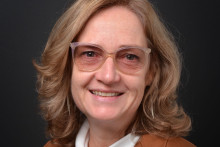De Graaff fears that the UT Board’s plan to have each PhD student spend 840 hours on schooling will take out the joy of PhD research and hamper its goals.
‘As it stands up it’s up to the PhD student and his supervisor to determine whether, which and what amount of courses should be followed,’ he explains. But this could rapidly change because under the new measure PhD students would have to complete altogether 30 ECs in coursework before they are allowed to submit their thesis.
Moreover, the plan is to introduce the measure as early as 1 September, a timing that de Graaff frowns upon. ‘This is a major policy change, but the UT Council never gave it the green light. Also, there are many uncertainties regarding the type of courses might be followed to obtain credits. There is talk of including language courses and of the possibility to follow courses at other universities - but no one really knows.’
A vagueness which might introduce a context in which the UT Board could soon introduce other changes in the curriculum that might not necessarily be favorable to the needs and rights of PhD students, de Graaff fears. Among the leading parties differences of interpretation of the measure can already be detected. ‘In answer to my written question whether my work for the UT Council could be rewarded with ECs the rector answered no, while the Twente Graduate School’s answer was affirmative.’
Bye bye pioneer?
His resistance against the measure is not out of a disregard of the importance for PhD students to follow relevant courses, de Graaff stresses. ‘I view a PhD as a traineeship to become a researcher and schooling should definitely be part of that.’
But ‘the precise amount of schooling that is needed and through which type of courses is something that a PhD student and his or her supervisor should decide on, as the most immediate experts on what is needed, rather than some random ‘forms and spreadsheets’. That way you create a situation whereby a PhD student enrolls in a course just to gain the 4 credits he is still lacking, rather than doing so to enhance his skills, which would mean a waste of precious research time.’
The newly proposed system could endanger the very nature and aims of PhD research, de Graaff fears: ‘Let’s face it, a PhD is all about exploration through specialization. That is what makes a PhD so rich. It’s all about following up one’s areas of interest and identifying new spaces for research.’
Implementing the measure could therefore ultimately undermine the quality of UT research. Substituting running for research: ‘When your aim is to breed ‘allrounders’ you will fail to win that golden marathon medal, because you kept on saying: come on, try and be a good runner at a 500 meter as well - as well as other distances.’
The Dutch system
If there was plenty of time, spending 30 ECs on coursework that might not be necessary would not be so problematic, de Graaff feels. But ‘the way it looks now PhD research may in future be shortened to 3 years. And don’t forget that most PhD students also teach, which cuts down the time that can be set aside for research by roughly six months.’
But what about the often much heralded American research system in which PhD students spend a relatively large amount of their times on courses? ‘I think the American system is not comparable to the Dutch one. Spanish courses may still be part of Bachelor programs in the US. Due to the equalitarian, non- leveled nature of American high schools, specialization comes relatively late in the university careers of Americans. It’s an entirely different system, really.’
Another issue is the quality of the courses. ‘Most PhDs I speak with are not exactly happy with the level of courses offered by the Twente Graduate School. They go because they have to.’
Discrimination?
According to the Graaff, the inflexible nature of the measure could also hamper equal opportunities between ‘Dutchies’ and foreign PhDs. ‘PhD students are being viewed as a uniform group, but there can be huge differences between, say, a Dutch PhD candidate in Engineering and a Kenyan PhD researcher at the ITC. The latter might want to follow language courses for example, unlike the Dutch student. Yet the allocated time for coursework would be equal for both.’
Finally, the new measure could harm the trust of existing PhDs who, under the new policy, will be encouraged ‘to conform as much as possible to the new rules’. Given the current vagueness as to how the measure will be implemented this could easily result in a situation whereby they can only defend their PhDs upon fulfillment of the 30 EC coursework obligation, in spite of the fact that they entered their contracts on very different conditions.’
Being critical is one thing – what would be the alternative, if the formalization of the amount of coursework required for PhD students is inevitable? ‘Why not simply have the PhD student and his or her supervisor detail the amount of hours that is needed for coursework, including for which type of courses, in the PhD student’s Training and Supervision Plan. That way the plan can be tailored to individual needs.’
Poll
To ensure a more democratic decision-making around the issue, de Graaff appeals to UT-ers to fill out a questionnaire on the matter which can be found at www.utwente.p-nut/phd-charter. ‘From PhD students to science directors and certainly also PhD supervisors. After all the measure could hamper their proven ways of success in dealing with guiding PhD students.
De Graaff hopes that the poll can facilitate an informed decision on the matter. ‘One that reflects the needs and wishes of the UT research community.’
Statement Twente Graduate School
Twente Graduate School is happy to see that, despite some persistent misunderstandings on details, the idea of the TGS educational certificate for PhD candidates based on their personal Training & Supervision Plan is accepted, also by Victor de Graaff. It is indeed true that a T&SP is a personal development plan that is regularly updated by the PhD candidate and the promotor to make sure the candidate gets the best possible and most useful training. Whether that is language, writing skills or specialised discipline related subject is up to the two, with a general 50/50 division between broadening and deepening. In the end the list of activities will be drawn up by the candidate, confirmed by the promotor, and approved by the director of TGS. So, it is not spreadsheet driven, but user designed. The 19 high quality programmes designed by UT research groups and outlined on the TGS website, clustered along the lines of the research institutes show the wealth of possibilities. The new aspect is that the educational part of the PhD trajectory is now formalised and will be monitored in PRODOC. Deviations from the guidelines can be proposed by the promotor based on content rather than obligation. Also exemptions based on previous gained competences (EVC’s) can be made and are foreseen in the workingprocesses. The first batch of graduating TGS PhD’s (Advanced Optics, see UT Nieuws /nieuws/58628/eerste_diplomas_graduate_school) easily scored over 30EC, showing that it is not hard to collect EC’s on the fly. Special subjects like Capita selecta can also be accommodated. Ex-PhD students aiming for a post-doc position, especially in the US, have an advantage when they can show evidence (the TGS certificate!) of their personal development besides their academic record and dissertation!
Petra de Weerd & Paul van Dijk, Twente
Graduate School
Read more about this discussion
here in Dutch.







